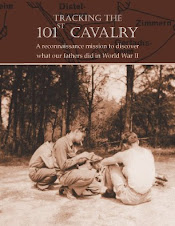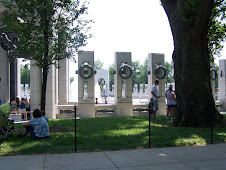
 In late fall of 2004, I sent my first large mailing (more than 100 letters) to men who had served in the 101st Cavalry. Out of more than 1,600, it was a small percentage, but it was a start. Earl Carmickle was one of the first to respond.
In late fall of 2004, I sent my first large mailing (more than 100 letters) to men who had served in the 101st Cavalry. Out of more than 1,600, it was a small percentage, but it was a start. Earl Carmickle was one of the first to respond.In the first paragraph of his letter, he told about a mortar shell that went off in his face. “I was treated the same day, but never got my Purple Heart,” he wrote. “My daughter tried, and she got proof I was on duty when hit, but it was denied. Our house burned years ago, and destroyed a lot of my Army records.”
In a Christmas card sent a few months later, he mentioned the Purple Heart again. It was clearly important to him.
Several months later I called Carmickle, and he shared some of his memories of the war. One of the stories he told was of Hill 283, which had been a major obstacle for the 101st just before they crossed the Saar River into Germany.
“This escape trench ran to the tallest hill in the area,” said Carmickle, “and that whole area was heavily mined. There were dead bodies all over the side of hill, German and American. Once we saw about 40 bodies up a little holler. We’d shovel dirt over the Americans at night to keep the animals away. I suppose someone came and got them after we pushed through. We kept their dog tags with them.”
My son Ted and I thought about his words as we walked through the woods near the area we believed was Hill 283. They sobered us on our journey, and made us respectful of the ground we walked on.
Of the Saar crossing, for which the men had waited more than a month, Carmickle spoke with humor: “I knowed it was coming,” he said. “I was glad when it did. I didn’t like the waiting. I enjoyed being on the move. It’s harder to hit a moving target.”
And Carmickle remembered a night spent in a cemetery near the Rhine. “Our lieutenant wanted to set up in a cemetery,” he said. “He said it would be safe there – the Germans wouldn’t fire on a cemetery. We were in the middle of setting up when an artillery barrage started – right there in the cemetery. That lieutenant was wounded in both legs.”
It was war, and the men didn’t only find death in the cemetery. “One night when it was real cold,” he said, “we entered a village that had been bombed pretty bad, and the buildings were still burning. Our sergeant told us to go into one of the houses – the roof had been flown off – and sleep. ‘At least,’ he said, ‘the four walls will keep the wind off of you.’ We bedded down on the floor. We never slept in a bed, since there were a lot of booby traps left in the villages: mines, trip wires, that kind of thing. We woke up in the morning and saw there was a woman in the bed. She was dead, probably killed in the bombing.”
Yesterday – May 18, 2008 – I was reminded of Earl Carmickle. I got an email from Shelia Ramuar – I have learned there are a lot of daughters looking for ways to honor their fathers who served in World War II, and Shelia is one. She told me to check a forum on Ancestry.com. Someone was looking for a veteran of the 101st Cavalry named Grady Collins. There, I found posts written by Earl Carmickle’s daughter, Jeannette Carmickle Walsh , dating back to 2002. She was looking for Collins in the hope he could testify that her father had been wounded, and he could finally get his Purple Heart.
“Maybe you can help her find someone,” Shelia said.
I knew I couldn’t help her find Grady Collins. The Grady Collins she was looking for had died in 1945.
“I lost one of my best friends,” John Almond had said of the day Grady Collins died. “We were up on a hill facing down into the town. We had a little machine gun nest there, and at night we’d pull back and stay in the little houses along both sides of the stream. We had mined the path with a trip wire, and one night I looked down and saw the tail of my overcoat dragging on that wire. I froze and lifted my coat.”
Almond cleared the wire that time, but, a few days later, his friend, Grady Collins wasn’t so lucky.
“Grady, he was from Gainsville,” said Almond, “was coming in one night and forgot about the trip wire, I guess, and set off the mine. I rode with him to the aid station. He didn’t make it.”
The man Carmickle had hoped might confirm that he had been wounded had died on February 25, three days after Carmickle was wounded. Carmickle’s lieutenant, 2nd Lt. Charles Pierce, who would have requested the Purple Heart, died the same day as Collins.
On the afternoon of February 25, Lt. Pierce and 2nd Lt. Alfred Kupferschmit, a member of an interrogation team, were with a recently captured prisoner of war, searching for weapons the German had thrown into the woods. Near the bottom of a hill, they met up with other members of the 116th: 1st Lt. Robert Schafer, S/Sgt. Walter Mennel, and Pvt. Earl Geiger, all of Troop C; and S/Sgt. John Schnalzer, Troop A. At the base of the hill, a concentration of mortar fire fell all around them. The blast killed 2nd Lt. Pierce instantly. Also killed that day were Lt. Schafer and S/Sgt. Mennel.
Complicating matters even more, Carmickle was wounded the same day as the squadron’s commanding officer, Lt. Col. Hubert Leonard, who spent the next few weeks in England recovering from his injuries.
In her post, Jeannette had written that her father remembered Grady Collins as a friend, but they had lost touch. Carmickle had told me that he lost track of several of his friends in the confusing days at the end of the war.
“I tried to stay in touch with my friend [Larry] Hayden,” he said, “but when I first came home, my mother had cancer. I got a Red Cross leave to be with her, and when I returned to base, I had missed everyone. They were gone. I had meant to get all their addresses.”
Carmickle went back to Arkansas after the war. He held different jobs, cutting timber for awhile, and then working in construction in Ohio. “I worked on some big buildings in Columbus,” he said.
Although they lost touch for awhile, he eventually did find Hayden, for whom Carmickle named his first son. “Hayden had gone home to Illinois, and he died in the 1960s,” Carmickle said.
"My dad, my hero, died February 21, 2007,” wrote Jeannette Carmickle Walsh. “I tried to get his Purple Heart issued; I worked for over 10 years, calling, writing, searching, and he still got turned down. I placed a Purple Heart ribbon in his casket, because he should have gotten it from the Army. It was the one thing he wanted before he died.”




